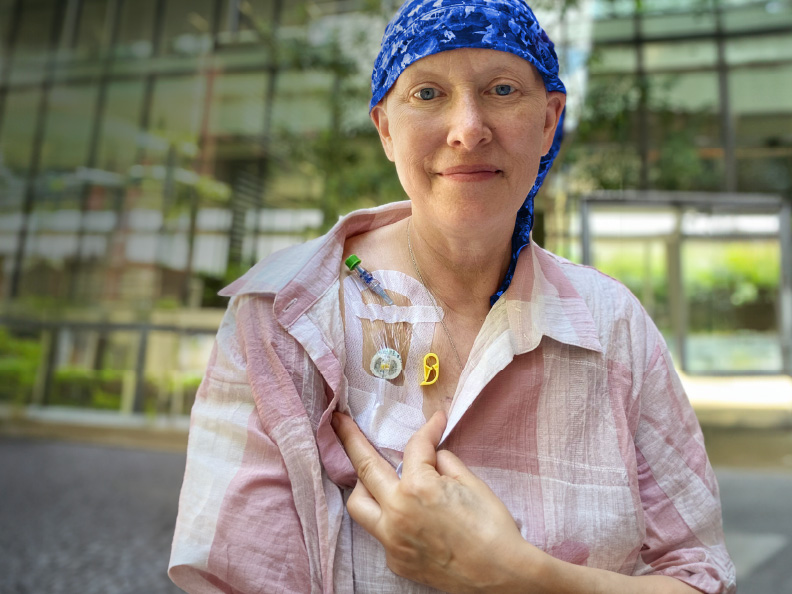Your gift is 100% tax deductible
Targeted Therapy for Laryngeal and Hypopharyngeal Cancers
What is targeted drug therapy?
Targeted drug therapy is the use of medicines that target or are directed at proteins on cancer cells that help them grow, spread, and live longer. These drugs work to destroy cancer cells or slow their growth. Their side effects are different from chemotherapy (sometimes less severe) and many are taken as a pill. Targeted drug therapy can be used to treat laryngeal and hypopharyngeal cancers.
Some targeted drugs, for example, monoclonal antibodies, work in more than one way to control cancer cells and may also be considered immunotherapy because they boost the immune system.
Drugs that target cancer cells with EGFR changes
Epidermal growth factor receptor (EGFR) is a protein that helps cancer cells grow. Drugs that target EGFR can be used to treat some advanced laryngeal and hypopharyngeal cancers.
Cetuximab for laryngeal or hypopharyngeal cancers
Cetuximab (Erbitux) is a monoclonal antibody, which is a man-made version of an immune system protein that targets EGFR. Laryngeal and hypopharyngeal cancer cells often have more than normal amounts of EGFR. By blocking EGFR, cetuximab can slow or stop cancer cell growth.
Cetuximab might be combined with radiation therapy for people with more advanced cancers, such as those that have spread locally but are not candidates for chemotherapy. Sometimes cetuximab might be combined with chemo drugs like cisplatin and 5FU in cases where the cancer has come back or has spread to distant parts of the body.
Cetuximab is given by infusion into a vein (IV), either once a week or every other week.
Possible side effects of drugs that target EGFR
The most common side effects of cetuximab are skin problems such as an acne-like rash on the face and chest during treatment, which can sometimes lead to infections. An antibiotic cream or ointment may be prescribed to help lessen the skin rash and related infections. Developing this rash might suggest the cancer is responding to treatment.
Other side effects can include headache, tiredness, fever, and diarrhea. A rare but serious side effect of cetuximab is an allergic reaction during the first infusion, which could cause problems with breathing and low blood pressure. You will be given medicine before treatment to help prevent this.
Talk to your doctor about the side effects you should watch for and what can be done to help prevent or treat them.
More information about targeted therapy
To learn more about how targeted drugs are used to treat cancer, see Targeted Cancer Therapy.
To learn about some of the side effects listed here and how to manage them, see Managing Cancer-related Side Effects.
- Written by
- References

The American Cancer Society medical and editorial content team
Our team is made up of doctors and oncology certified nurses with deep knowledge of cancer care as well as editors and translators with extensive experience in medical writing.
Bonner J, Giralt J, Harari P, et al. Cetuximab and Radiotherapy in Laryngeal Preservation for Cancers of the Larynx and Hypopharynx: A Secondary Analysis of a Randomized Clinical Trial. JAMA Otolaryngol Head Neck Surg. 2016;142(9):842-849.
Leeman JE, Katabi N, Wong, RJ, Lee NY, Romesser PB. Chapter 65 - Cancer of the Head and Neck. In: Niederhuber JE, Armitage JO, Doroshow JH, Kastan MB, Tepper JE, eds. Abeloff’s Clinical Oncology. 6th ed. Philadelphia, Pa: Elsevier; 2020.
Mendenhall WM, Dziegielewski PT, Pfister DG. Chapter 45- Cancer of the Head and Neck. In: DeVita VT, Lawrence TS, Rosenberg SA, eds. DeVita, Hellman, and Rosenberg’s Cancer: Principles and Practice of Oncology. 11th ed. Philadelphia, Pa: Lippincott Williams & Wilkins; 2019.
National Cancer Institute. Physician Data Query (PDQ). Hypopharyngeal Cancer Treatment. October 04, 2019. Accessed at https://www.cancer.gov/types/head-and-neck/hp/adult/hypopharyngeal-treatment-pdq on September 8, 2020.
National Cancer Institute. Physician Data Query (PDQ). Hypopharyngeal Cancer Treatment. October 04, 2019. Accessed at https://www.cancer.gov/types/head-and-neck/patient/adult/hypopharyngeal-treatment-pdq on September 8, 2020.
National Cancer Institute. Physician Data Query (PDQ). Laryngeal Cancer Treatment. January 23, 2020. Accessed at https://www.cancer.gov/types/head-and-neck/hp/adult/laryngeal-treatment-pdq on September 8, 2020.
National Cancer Institute. Physician Data Query (PDQ). Laryngeal Cancer Treatment. November 21, 2019. Accessed at https://www.cancer.gov/types/head-and-neck/patient/adult/laryngeal-treatment-pdq on September 8, 2020.
National Comprehensive Cancer Network (NCCN). NCCN Clinical Practice Guidelines in Oncology: Head and Neck Cancers. V.2.2020 – June 09, 2020. Accessed at www.nccn.org/professionals/physician_gls/pdf/head-and-neck.pdf on September 8, 2020.
Steuer CE, El-Deiry M, Parks JR, Higgins KA, Saba NF. An update on larynx cancer. CA Cancer J Clin. 2017;67(1):31-50.
Susman E. Rash correlates with tumour response after cetuximab. Lancet Oncol. 2004;5(11):647. doi:10.1016/s1470-2045(04)01627-4.
Last Revised: January 21, 2021
American Cancer Society medical information is copyrighted material. For reprint requests, please see our Content Usage Policy.
American Cancer Society Emails
Sign up to stay up-to-date with news, valuable information, and ways to get involved with the American Cancer Society.




